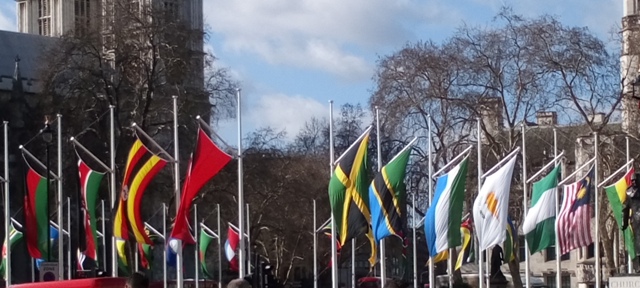 "If the Commonwealth was able to survive without the Secretariat in the past, might it also be able to do so in the future?"
"If the Commonwealth was able to survive without the Secretariat in the past, might it also be able to do so in the future?"
The website of the Commonwealth Secretariat states confidently that ‘[t]he modern Commonwealth came into being 70 years ago with the London Declaration, signed on 26 April 1949.’ One could easily quibble with this statement. But if we are to accept the 1949 Declaration as the modern Commonwealth’s point of origin, it’s worth remembering that this was made a good 16 years before the creation of the Secretariat in 1965. So if the Commonwealth was able to survive without the Secretariat in the past, might it also be able to do so in the future? Indeed, might its prospects actually be enhanced by the disappearance of the Secretariat?
Although there seems little immediate prospect of it going into liquidation, the Secretariat has certainly been placed on a starvation diet. Its funding has declined from £51.9 million in 2012/13 to £37.9 million in 2016/17. The main shortfall has been due to a drop in contributions by member states to the organisation’s development arm, the Commonwealth Fund for Technical Co-operation (CFTC), which, unlike those to the Commonwealth Secretariat Fund and the Commonwealth Youth Programme, are made on a voluntary rather than an assessed (compulsory) basis. Overall, the shift in the balance between voluntary and assessed contributions over a relatively short period of time has been startling. Whereas in 2012/13, 63 per cent of income came from voluntary contributions and 37 per cent from assessed, the balance in 2017/18 was 38% voluntary and 62% assessed.
This reflects a profound lack of confidence in the effectiveness of the Secretariat on the part of the Commonwealth’s major donor states. Visiting India in 2019, Philip Parham, the UK’s ‘Commonwealth envoy’ referred to a £500 million investment by Britain in Commonwealth causes. Yet the vast majority of that will be delivered directly by the UK, not through the Secretariat. And the UK’s modest annual contribution to the Secretariat also has to be seen in the context of the £50 million in matching funds which the Department for International Development (DfID) gave to the Queen Elizabeth Diamond Jubilee Trust, established in 2012, and of the current fundraising efforts for its successor, the Queen’s Commonwealth Trust.
The obvious answer to the question of how the Commonwealth managed without the Secretariat before 1965 is that the British government acted as a clearing house, via the Commonwealth Relations Office, and that such a role would no longer be politically acceptable. In effect, however, compared to the activities of DfID and the foreign aid departments of the Commonwealth’s other major donors, the financial contribution by the Secretariat to what one might broadly term ‘Commonwealth causes’ is now negligible. And if the cost of its headquarters was not underwritten by the UK, its tiny budget would make even less impact. In recent years, the Secretariat has proven so politically inept that any unease that might arise from the UK (or some other member with deep pockets) taking on a residual coordinating role could hardly compare with the embarrassment caused by the 2013 CHOGM in Sri Lanka or by ComSec’s clumsy efforts at ‘reform’.
There are other respects in which the survival of the Secretariat beyond its natural shelf-life has begun to damage the Commonwealth brand. Its frantic efforts to raise its profile on social media have merely fuelled unrealistic expectations about its ability to deliver results in a wide range of different areas. More fundamentally, it promotes the flawed conception of the Commonwealth as an essentially inter-governmental organisation, united by ‘shared values’, the members of which can be sanctioned or even expelled if they fall short of some very high expectations. In practice, an increasingly risk-averse Secretariat has lacked the authority and the courage to ensure the effective policing of that notion of the organisation, just as it lacks the resources to offer enough of substance to its more powerful members for them to take it seriously.
The truth is that most member states of the Commonwealth are essentially bound together by a common history which has led to some strong family resemblances in the ways in which they conduct their politics, enforce their laws and educate their young people. There are a number of organisations, such as the Commonwealth Parliamentary Association (CPA) and the Association of Commonwealth Universities (ACU), that have developed around these institutional and cultural bonds and have a far longer pedigree than the Secretariat. Those two examples are also well funded and well led.
So why not put the Secretariat out of its misery, and end the failed experiment of treating the Commonwealth as a rules-bound club of member states? Funding could be diverted instead to bolster the small handful of competently run and genuinely international organisations that promote the shared political and cultural heritage of the Commonwealth. Little would be lost in the process. Election monitoring, one of the few genuinely valuable tasks that the Secretariat has undertaken since the 1990s could, for example, easily be carried out under the aegis of the CPA. In April 1949, leading figures in the organisation were prepared to think both pragmatically and imaginatively about what the Commonwealth relationship meant. 70 years later, it is time to do so again.
Philip Murphy is the Director of the Institute of Commonwealth Studies, London.
[Opinion articles do not reflect the position of the Round Table Editorial Board.]



